Władysław Biały was completely unique. Extravagant and capricious eccentric, unable to control his own home, let alone any country. At the same time, it was an important contender to the Polish throne, competing with Jadwiga Andegaweńska herself.
Władysław the White, born around 1330, came from the Kujawski Piast line, the same line that gave birth to Władysław Łokietek. His great-grandfather was also the grandfather of King Kazimierz, which undoubtedly gave Włodek a reputation. Others would translate respect into careers, into titles and money. This prince, however, was clumsy to a degree that was hard to believe.
He ruled the microscopic principality of Gniewkowo and if he was coping with this (not so big) burden, it was probably only thanks to his resourceful wife. The Duchess of Gniewko died shortly after the wedding, leaving her husband for political obligations. It was too much for Władysław. At the age of about forty, he gave his principality as a pledge to King Kazimierz, in return collecting a thousand gold coins, that is ... a modest three and a half kilograms of gold. The last independent scrap of Kujawy went under the hammer for a song.
Wanderer, pilgrim, monk
It was a great deal for the king. For Władysław Biały - an opportunity to forget about any responsibility, even for a moment. The year was 1363 or 1364. The Prince went on a trip to the Holy Land and visited the Holy Sepulcher. On the way back, he touched Prague, and for some time he also stayed at the castle of the Grand Master of the Teutonic Order. Finally, he visited Avignon and was admitted to the presence of the Pope himself, Urban V. Then he probably ran out of money, because instead of going to Poland, he settled in a local religious house, wearing a Cistercian habit.
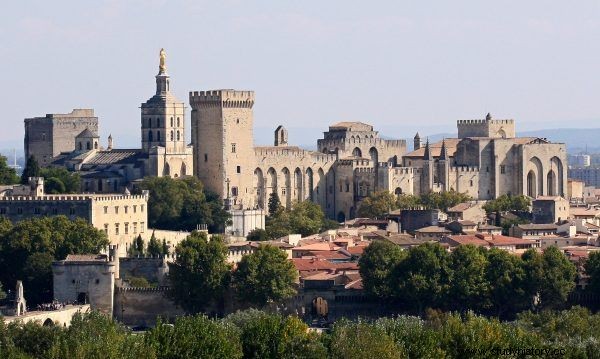
Papal Palace in Avignon. Contemporary photography
The reality of a prayerful life did not meet the prince's expectations. After just two years, he escaped from the monastery and settled in another - for a change Benedictine. There is even a letter from the Cistercian abbot rebuking the Pole for his insubordination, inability to follow the rules and general obscurity. Władysław, without thinking about these exhortations, was now playing the classic monk. He "played" because there was no real calling.
After a few years, he got bored of the role again. It was then, and specifically in December 1370, that a message sent by opponents from Greater Poland came to Dijon, where this dynastic raisin was staying. They suggested to Władysław that he return to Poland and proclaim himself king as a close relative of the late Kazimierz.
Pretender to the throne
It seemed that the opportunity to return to big politics was just perfect. The King of Poland passed away to eternity leaving no male heir. Although under dynastic agreements, the throne passed into the hands of the Hungarian monarch, Louis of Anjou, but Władysław was able to put forward his own claims resulting from the blood relationship. Moreover, he could use family arguments - he was not only related to the deceased king of Poland, but also directly related to the king of Hungary. The wife of the monarch who had just been crowned in Krakow, Elżbieta Bośniaczka, was his niece.
The awkward prince, without thinking much, accepted the offer of the Polish rebels. They were not even opposed to Hungarian governments, but most of all ... to women's governments. Ludwik accepted the Polish crown, but the real power in the country was taken over by the king's mother and also the sister of the late Casimir the Great, Elżbieta Łokietkówna, appointed as the official regent. Domineering, ambitious and ruthless politician, striving to bring order and obedience to the Vistula River. Władysław felt that Poles would gladly throw off the yoke of woman's orders. But he definitely had no idea about organizing the coups…
First, he asked the Holy Father to release him from his religious vows. Maybe he was not laughed at, but for sure - he was chased away, instructed to return to the cell and pat prayers. Undaunted by the failure, Władysław decided to go… straight to Hungary. And tell Louis that he will either be rewarded or will undermine his royal power.
He was deluding that he would lose something due to the Gniewko roots of Elżbieta Bośniaczka. The challenger was fooled by all these amazing stories that it was the Queen was shaking the state of Saint Stephen . He did not understand that it was a completely different queen. And that the Bosnian woman, even if she wanted to, would not be able to support him in any way, because her husband does not take into account her opinion, and her mother-in-law pushes her to the complete margin. Elżbieta Łokietkówna had to be persuaded. And this one wasn't going to negotiate with the usurpers.
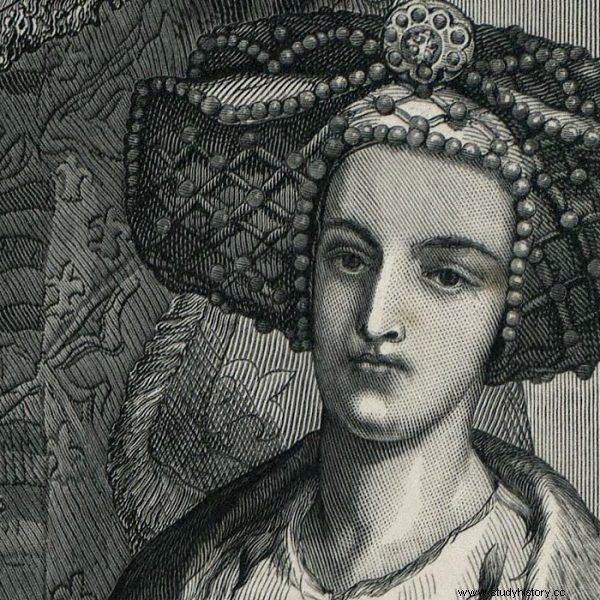
Elżbieta Bośniaczek as imagined by Jan Matejko
Revolt against women's rule
The uncomfortable guest was quickly asked to leave the Budzin castle. Not only did he not get the Polish crown, but he was not even given any scrap that would close his mouth. The disregard was by all means justified. Władysław's pathetic incompetence did not turn out to be the most important thing in the world. What mattered most to his career was the support of the inhabitants of Wielkopolska, disappointed with women's governments and filled with a sense of injustice. The ground was prepared for a revolt.
In 1373 Władysław the White unexpectedly appeared in Gniezno and Inowrocław. He had a small army with him and he took over both cities with ease. From there, he went to his home town of Gniewkowo, and then to Złotoria. He swiftly appropriated all the lands that his father had controlled years ago. He probably hoped that the show of strength would terrify the regent and that she would send emissaries soon, pleading for grace and proposing the division of the country. At one point, his predictions turned out to be correct. Elizabeth did not hesitate to react. Instead of diplomats, however, she sent soldiers. Władysław curled his tail and ran away until it was dusted. This does not mean, however, that he has forgotten his grievances.
Second try
In 1375 he managed to capture Złotoria by trickery once again and unleash a destructive war on a large scale. Although Elżbieta Łokietkówna's subordinates smashed his army in the chaotic battle of Gniewkowo, they were unable to break through the walls of the mighty fortress.
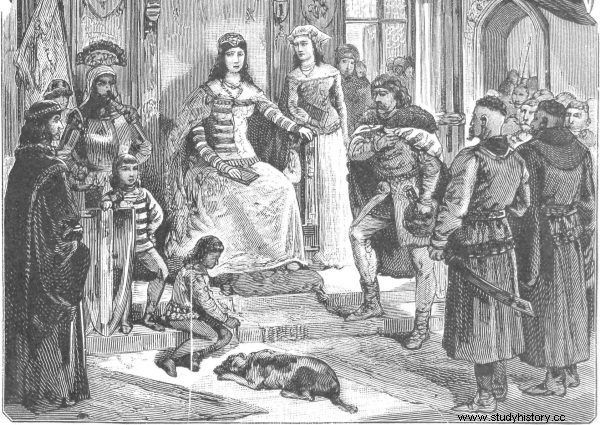
Elżbieta Łokietkówna in the vicinity of the manor house in the graphics of Fr. Pillati
The prince was spreading terror in Kujawy, letting the villages smoke, kidnapping peasants and collecting loot. He also managed to burn down the suburbs of Inowrocław and the outer gates of that city. He directed his most distant forays as far as Greater Poland, also from there bringing back valuable achievements. His rebellion lasted almost a year, and the prince only strengthened Złotoria during this time, transforming it into an almost impregnable bastion.
During these doomsday months Regent Elżbieta Łokietkówna was not in the country. However, its officials were active, especially the starost general of Wielkopolska, Sędziwój from Szubin. He was the one who pulled the whole army to Złotoria, and at the beginning of the summer of 1376 he closed the fortress in a siege. Władysław the White fought fiercely and relentlessly. He attacked the enemies with the use of throwing machines placed inside the fortress. He also used the river flotilla which he had collected over the last months and which now offended the besieging waters. When one of his people, who predicted the eventual defeat, entered into a deal with the queen's subjects, Władysław, for example, burned him at the stake. Finally, however, even he had to acknowledge his failure.
It doesn't even matter that supplies were running out in the fortress. First of all, the prince ran out of allies. Władysław the White announced a war for dignity, for a well-deserved inheritance and for better (male) governments. The knights from Kujawy and Greater Poland, however, quickly noticed that instead of a liberator, they had a ruthless robber and bandit thinking only about their own profit.
The changeling agreed to the negotiations. And King Louis and the Queen Mother, for the sake of peace, finally offered him a specific compensation.
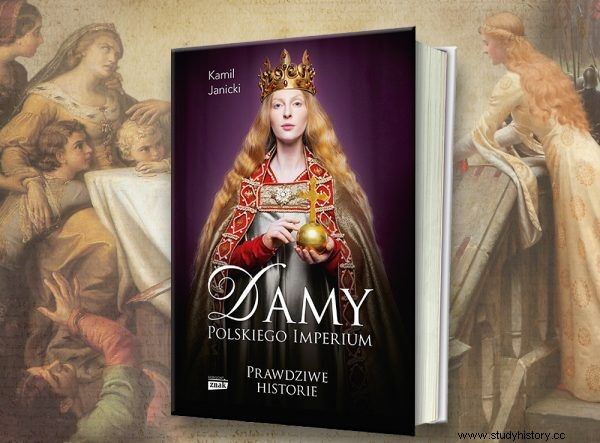
A true picture of medieval Poland. History without a powder in the new book by Kamil Janicki:"We will give the Polish empire". You can buy it at empik.com
Too fine a punishment
Władysław the White was to go to Hungary, but not as a prisoner, but as a high church dignitary. The ruler made him in 1377 the superior of Pannonhalma - the oldest and most influential Benedictine abbey in the whole country. Władysław became, at least officially, the most important clergyman after the bishops.
He gained not only a position he could never dream of in the microscopic Duchy of Gniewko, but also a generous income. Ludwik promised him ten thousand gold coins (i.e. thirty five kilograms of pure gold) in exchange for the final renunciation of any claims to the Kuyavian heritage. On account of this sum, Władysław received a thousand coins a year. However, he managed to collect ... only two installments.
Historians suspect that if a rebel landed on a soft, silk-trimmed pillow, and he did not break all his members, it must have been due to his niece, the younger Hungarian queen, Elizabeth of Bosnia. The royal spouse apparently interceded for his uncle and, to his own surprise, persuaded Ludwik to show grace to the adventurer. It soon became apparent, however, how feeble the Bosnian influence was and how little her protection meant.
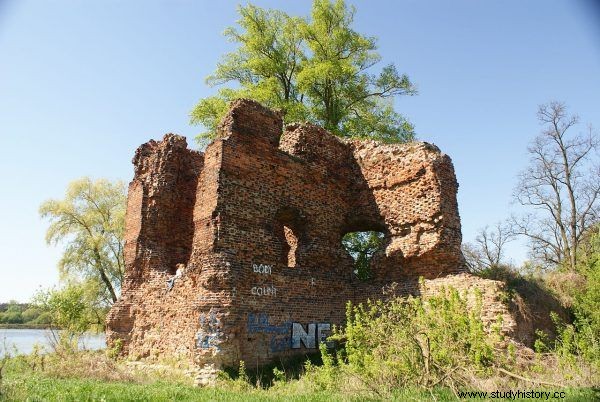
Remains of the defensive tower of the castle in Złotoria. Contemporary photography
The ailing king, who had a feeling that a grim reaper would visit him any day, decided that the matter of the usurper should be brought to an end. And remove him from the power game once and for all.
The monk for the third time
It is impossible to say what exactly happened. In any case, the plot was revealed, and Władysław the White, trembling for his own life, fled Hungary as quickly as possible. It is possible that the Bosnian herself warned him about the attack. It is also known that she asked trusted clergymen to provide the abbot with confidential letters. The last epistle went to Władysław Biały just a few days before he abandoned his Hungarian monastery. At the end of October 1379, the prince can be seen in Gdańsk, and the following year - in France, where he re-enters the monastery in Dijon as a private monk.
Ludwik does not send a chase after him. The case of the would-be murder is getting much too loud to make a renewed attempt to attack. The resigned king also pays the White the rest of the sum promised for the Duchy of Gniew. And perhaps even on his deathbed he reminds himself that he failed to protect his daughters from dangerous competition.
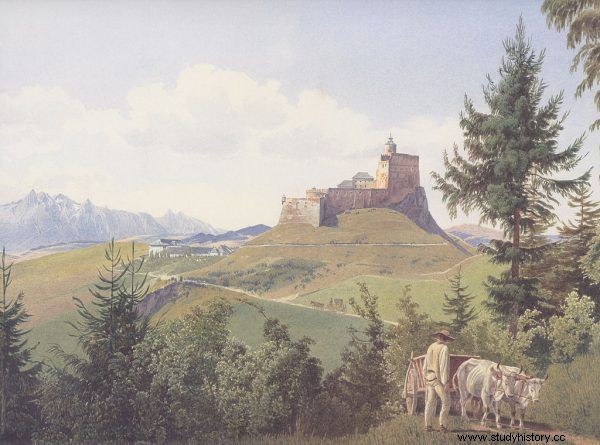
Pannonhalma Abbey in the mid-19th century
Władysław Biały sticks to his decision not to return to the world of politics for a long time. With the money received, he neither buys an army nor looks for supporters. He gives the bags of gold to Abbot Dijon, asking that in return he could receive a double portion of food and wine every day, and that he would be re-housed in a separate guest house with a garden located near the monastery buildings.
He is as meek as a lamb as long as the sick Anjou lives. Even after Ludwik's death, he refuses to leave the monastery, although even the Pope urges him to take such a step. Or rather:one of the two popes, because at that time a schism arises in the Church between the Holy Father in Rome and his competitor entrenched in Avignon.
"Poles want him to be their monarch"
Clement VII (remembered today as the "Antipope") granted the prince dispensation from his monastic vows, and reminded him that, according to the ancient tradition in Poland, no woman should be allowed to the throne. He did not care pay tributes to Andegavan daughters nor the precedent in the form of several years of rule by Elżbieta Łokietkówna. He did not want to respect the last will of Ludwik Anjou, according to which one of the Hungarian queens was to become the new Polish ruler.
According to the bull issued by Klemens, the only proper candidate for power in the country on the Vistula River was Władysław the White - the closest relative of King Kazimierz's sword. Klemens even emphasized that it was the Poles themselves that "want him to be their monarch", although he must have known that not only Krakow, but also Greater Poland elites supported Jadwiga Andegaweńska's candidacy and that for the time being they remained faithful to her mother, Elżbieta Bośniaczka.
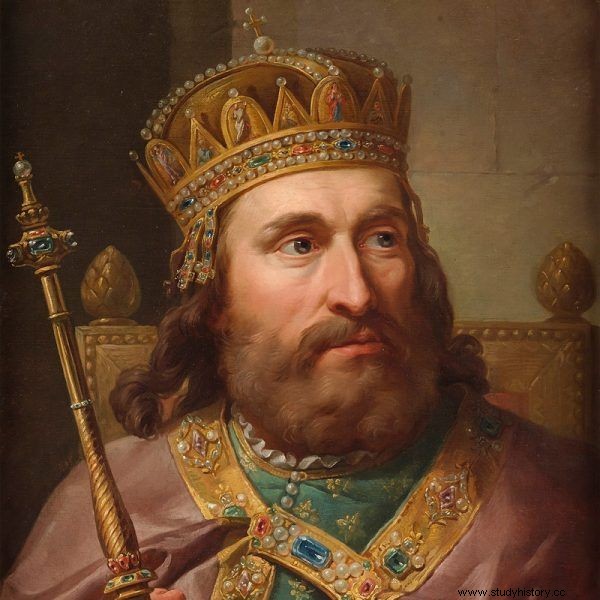
Portrait of Ludwik Węgierski by Marcello Bacciarelli.
It is doubtful whether that was the case. Władysław probably did not think that the nation was waiting for him. He defended himself for a long time against initiating any new brawl. It was only after a few months of reflection that he left Dijon and went to Strasbourg. So to the same German city where he recruited supporters before his first military expedition in 1373. This time, however, he did not start any war.
He was observing the situation in Poland from a distance, but he probably was not able to find any supporters of his cause. Or maybe - he was afraid to go out against his niece. Finally he died, probably of natural causes, in 1388.
Selected bibliography:
The article was based on materials collected by the author during the work on the book "Ladies of the Polish Empire. The Women Who Built a Power " . Some of these items are shown below. Full bibliography in the book.
- Dąbrowski J., Elżbieta Łokietkówna 1305-1380 , Universitas, Krakow 2007.
- Dąbrowski J., The last years of Ludwik the Great 1370–1382 , Universitas, Krakow 2009.
- Gzella J., The Małopolska elite of power during the reign of Ludwik Węgierski in Poland in the years 1370–1382 , Nicolaus Copernicus University, Toruń 1994.
- Marzec A., New King and New Elites. The Reign of Louis the Great in Poland 1370–1382 [in:] Hungaro-Polonica Young Scholars on Medieval Polish-Hungarian Relations , ed. D. Bagi, G. Barabás, Z. Máté, Történészcéh Egyesület, Pécs 2016.
- Sroka S.A., Elżbieta [in:] The Piasts. Biographical Lexicon , edited by K. Ożóg, S. Szczur, Wydawnictwo Literackie, Krakow 1999.
- Sroka S.A., Władysław Biały [in:] The Piasts. Biographical Lexicon , edited by K. Ożóg, S. Szczur, Wydawnictwo Literackie, Krakow 1999.
- Szczur S., On the Andegavan succession in Poland , "Annals of History", vol. 75 (2009).
- Śliwiński J., Władysław Biały (1327 / 1333–20 February 1388). The last prince of Kuyavia. The greatest traveler among the Piasts , Avalon, Krakow 2011.
- Wyrozumski J., Genesis of the Andegavan succession in Poland , "Historical Studies", vol. 25 (1982).
- Żmigrodzki Z., Implementation of Ludwik's dynastic plans in Poland , "Kwartalnik Historyczny", vol. 45 (1931).
